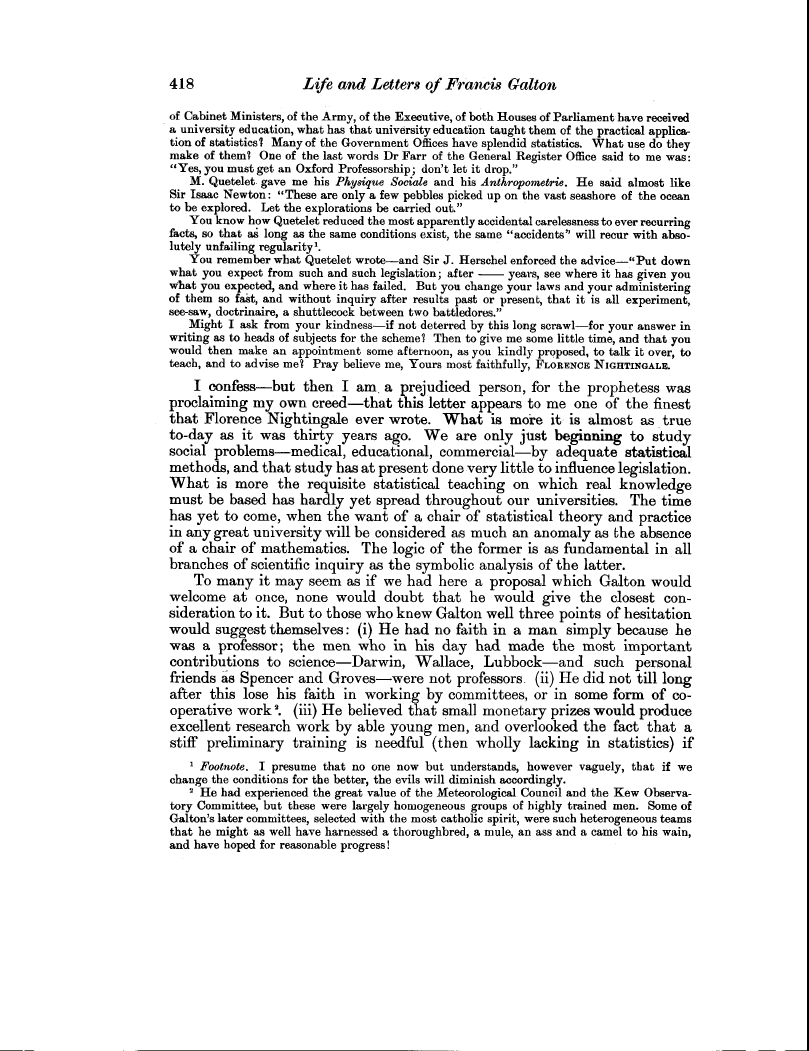418 Life and Letters of Francis Galton
of Cabinet Ministers, of the Army, of the Executive, of both Houses of Parliament have received a university education, what has that university education taught them of the practical applicar tion of statistics? Many of the Government Offices have splendid statistics. What use do they make of them? One of the last words Dr Farr of the General Register Office said to me was: "Yes, you must get an Oxford Professorship; don't let it drop."
M. Quetelet. gave me his Physique Sociale and his Anthropometrie. He said almost like Sir Isaac Newton: "These are only a few pebbles picked up on the vast seashore of the ocean to be explored. Let the explorations be carried out."
You know how Quetelet reduced the most apparently accidental carelessness to ever recurring facts, so that as long as the same conditions exist, the same "accidents" will recur with absolutely unfailing regularity'.
You remember what Quetelet wrote-and Sir J. Herschel enforced the advice-" Put down what you expect from such and such legislation; after years, see where it has given you what you expected, and where it has failed. But you change your laws and your administering of them so fast, and without inquiry after results past or present, that it is all experiment, see-saw, doctrinaire, a shuttlecock between two battledores."
Might I ask from your kindness-if not deterred by this long scrawl-for your answer in writing as to heads of subjects for the scheme? Then to give me some little time, and that you would then make an appointment some afternoon, as you kindly proposed, to talk it over, to
teach, and to advise me? Pray believe me, Yours most faithfully, FLORENCE NIGHTINGALE.
I confess-but then I am. a prejudiced person, for the prophetess was proclaiming my own creed-that this letter appears to me one of the finest that Florence Nightingale ever wrote. What is more it is almost as true to-day as it was thirty years ago. We are only just beginning to study social problems-medical, educational, commercial-by adequate statistical methods, and that study has at present done very little to influence legislation. What is more the requisite statistical teaching on which real knowledge must be based has hardly yet spread throughout our universities. The time has yet to come, when the want of a chair of statistical theory and practice in any great university will be considered as much an anomaly as the absence of a chair of mathematics. The logic of the former is as fundamental in all branches of scientific inquiry as the symbolic analysis of the latter.
To many it may seem as if we had here a proposal which Galton would welcome at once, none would doubt that he would give the closest consideration to it. But to those who knew Galton well three points of hesitation would suggest themselves : (i) He had no faith in a man simply because he was a professor; the men who in his day had made the most important contributions to science-Darwin, Wallace, Lubbock-and such personal friends as Spencer and Groves-were not professors. (ii) He did not till long after this lose his faith in working by committees, or in some form of cooperative work'. (iii) He believed that small monetary prizes would produce excellent research work by able young men, and overlooked the fact that a stiff preliminary training is needful (then wholly lacking in statistics) if
' Footnote. I presume that no one now but understands, however vaguely, that if we
change the conditions for the better, the evils will diminish accordingly.
2 He had experienced the great value of the Meteorological Council and the Kew Observatory Committee, but these were largely homogeneous groups of highly trained men. Some of Galton's later committees, selected with the most catholic spirit, were such heterogeneous teams that he might as well have harnessed a thoroughbred, a mule, an ass and a camel to his wain, and have hoped for reasonable progress!

